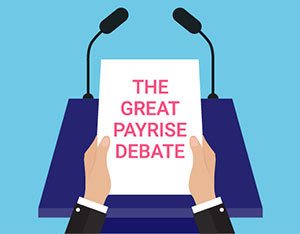Asking for more money is difficult and preparation is the absolute key when it comes to approaching the conversation with confidence and in turn being more persuasive.
The more thorough your research, the more likely you are to walk away with a result you’re happy with, says the Director and Master Coach at The Salary Coach in Sydney, Catherine Heilemann.
She suggests researching the following questions:
- What's happening in the market at the moment?
- What are employers looking for?
- What do you know about the organisation, whether you’re already an employee there or not?
Managers will often respond to your request by trotting out the most common excuses for rejecting a raise. Make sure you’re listening carefully – and take some notes if possible.
Here are Heilemann’s tips for rebutting the most common excuses:
-
Excuse #1: “We've benchmarked you.”
Being told that you’re already being paid what you’re worth is one of the most common rebuttals.
If this is the response you’re given, your best first step is to get a better understanding of how the benchmarking at the business is done.
Try to ask as many questions as you can to get a good understanding of why you were benchmarked where you were and what skills, knowledge or experience would be required to move up the ranking.
If you feel that you’re not being fairly benchmarked, your next step should be to research the market, speak to recruiters and lean on your network to gain more knowledge about what certain roles are paying and where you might sit in the market.
Once you’ve gathered the information you need, set up a meeting to discuss next steps. At this meeting you should either be prepared to present a stronger case for your pay rise, or agree on some terms for a pay rise in the future. -
Excuse #2: “Times are tough”
It’s a little-known fact that when organisations go through contractions, they will have identified who they particularly want to keep. Often there is discretionary funding available to attract or keep the right people and that's why it's so important to differentiate yourself from your peers.
You can overcome this excuse by saying, “I understand that times are tough, but it’s also my understanding that I'm a valued employee and I would still like to have a conversation with you about my salary or what other benefits we can negotiate in lieu of a raise." -
Excuse #3: “Your performance doesn’t warrant a raise.”
Try to understand why your manager has said this and the way in which your performance is being measured - this will likely include discussing your role, responsibilities and achievements.
If you don’t feel comfortable challenging the statement there and then, say, “Thank you for the information. I really appreciate it and need some time to think about.”
Alternatively, you could ask, “What would it take for you to consider me a high performer?”
If you’ve met or exceeded what you and your manager agreed upon and they still say your performance doesn’t justify a raise, say, “We agreed on a set of measurables, so I’m wondering where there’s been a communication breakdown?” -
Excuse #4: “Compared to your colleagues you’re being paid well.”
Try to redirect the conversation back to your own performance, and link this to market rates and benchmarks for the role itself.
It’s helpful to have a mental list of your specific achievements that you can discuss, and the ways in which you’ve added value to the business.
If there appears to be a strong resistance to a monetary raise, consider your other options as there may be discretionary funding available. This could include flexible working arrangements such as a compressed working week or study leave.
And try to be persistent and consistent – sometimes the best strategy is to play the long game. Always work to ensure that you stand out from the pack – a campaign for a pay rise needs to be a year-round undertaking with consistent check-ins and communication.



